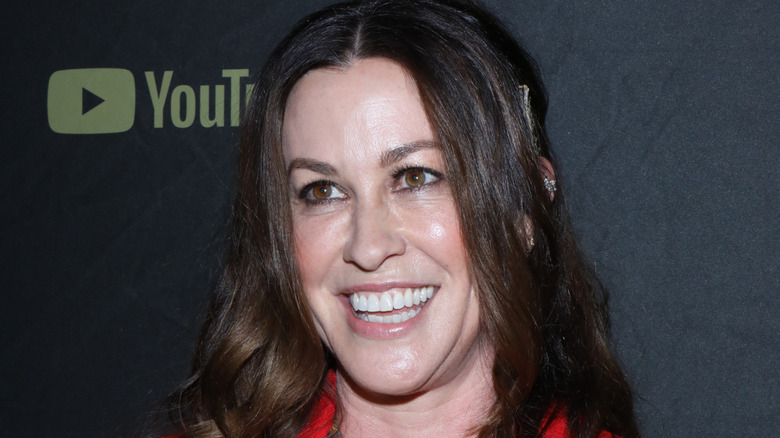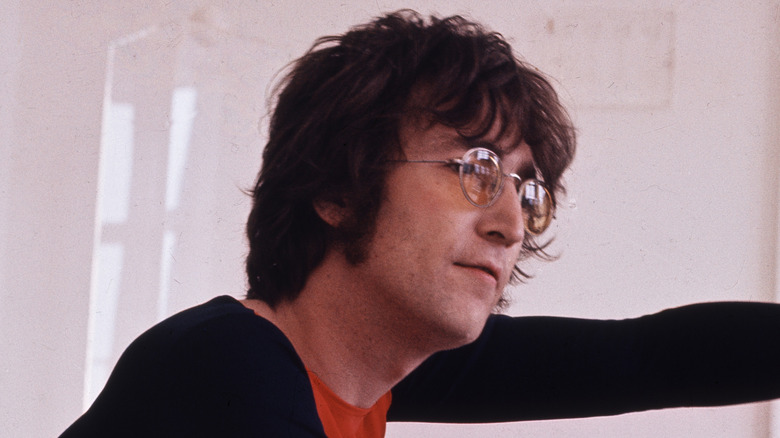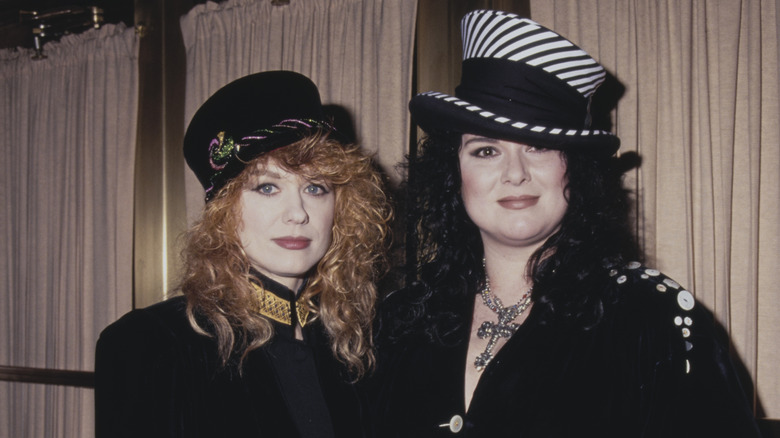Rock Songs That Were Written To Get Revenge
True artists are willing, and looking, to find inspiration absolutely anywhere. And while most rock songs of the last 100 years tend to be about love, lust, being in a rock band, or the sheer power of rock 'n' roll to unite and liberate, music may be found in the most unexpected places. There are plenty of songs based on historical events, for example, and songs built around real-life incidents, such as perceived slights or grievances perpetuated by rivals, enemies, or organizations. Many of the most prominent rock stars of all time have written their own material, and they're adept at converting their observations of, and emotional responses to, events in their lives into songs — lyrically devastating, withering, and pointed songs, if all goes well.
Here are the stories of some rock stars who used their talents and platforms to pull off some of the greatest acts of revenge ever, in a musical way. They truly turned something bad into something good, exacting vengeance in a high-profile way: taking an unpleasant experience and building art out of it in the form of a classic song.
Life on Mars (David Bowie)
In the mid-1960s, David Bowie was still recording under his real name, Davey Jones, and not moving many units of his singles. But he had an arrangement with a music publisher, which landed him paid songwriting tasks. In 1968, he got the chance to write an English version of the French pop song "Comme d'habitude." "I wrote some really terrible lyrics — I think it was called 'Even a Fool Learns to Love,'" Bowie recalled in a 2002 interview (via Australia's ABC).
Bowie turned in his lyric sheet and figured his work would remain obscure, but to his surprise, he heard the melody of "Comme d'habitude" on the radio one day in 1969. "I thought, 'That's the tune, it must be my song, but hang on, these are different lyrics.'" The recording: "My Way," as performed by Frank Sinatra. After Bowie had composed his English-language take on "Comme d'habitude," singer-songwriter Paul Anka bought the rights to the original piece, wrote another set of lyrics, and handed it over to Sinatra, who made it one of his signature songs. The industry machinations upset Bowie but also drove him to create something new and just as epic as "My Way." "So I did 'Life on Mars?' which was my sort of revenge trip on 'My Way,'" Bowie said. That song, full of dramatic crescendos and orchestral sounds, made it onto his 1973 album "Hunky Dory" and became a top-five chart hit in the U.K.
One Way or Another (Blondie)
After breaking into the U.S. charts for the first time in 1979 with the No. 1 hit "Heart of Glass," Blondie followed that disco tune with the snarling punk rock song "One Way or Another." Co-written by Blondie singer Debbie Harry, it's told from the point of view of a dangerous character who threatens to track down and "get" the subject, at some point in the immediate future, and then exact harm. Harry pulled from a harrowing personal experience to create "One Way or Another." "I was actually stalked by a nutjob so it came out of a not-so-friendly personal event. But I tried to inject a little bit of levity into it to make it more lighthearted," she told Entertainment Weekly. "You know, just shake it off, say one way or another, and get on with your life."
The stalking incident, about which Harry got the final word, occurred in the years before the formation of Blondie. After a string of failures in her nascent musical and acting careers, Harry moved from New York City to her home state of New Jersey and entered into a relationship with an individual who turned out to be obsessive and violent. "I broke up with him and he became a stalker and he was really good at it," the singer said in "Deborah Harry: Platinum Blonde." "I had to move out of New Jersey! So it might have been the first stalker song ever written."
How Do You Sleep (John Lennon)
The break-up of the Beatles in 1970 can be attributed in large part to creative tensions between John Lennon and Paul McCartney. The animosity extended into the personal sphere for years. In 1971, McCartney took to wax his issues with Lennon, who at that point was firmly entrenched in his social activism era. On "Too Many People," a song from McCartney's album "Ram," the singer quips, "too many people preaching practices." In a 1984 interview with Playboy, McCartney admitted that the line was about Lennon. "He'd been doing a lot of preaching, and it got up my nose a little bit," he said (via Far Out).
Lennon got the message. "I heard Paul's messages in 'Ram' — yes there are dear reader!" Lennon vented to Crawdaddy (via The Beatles Bible) after recording "How Do You Sleep" in 1971, which he loaded with anti-McCartney references and jabs. He quips that "Sgt. Pepper took you by surprise" and that "those freaks was right when they said you was dead," alluding to a landmark Beatles album and the "Paul Is Dead" death-and-doppleganger-replacement conspiracy theory, respectively. The lyric "And since you've gone, you're just another day," mocks McCartney's 1971 single "Another Day." Lennon originally wrote that line as "The only thing you done was yesterday / you probably pinched that b**** anyway" but was persuaded to change it by his manager, who feared a libel lawsuit over the suggestion that McCartney stole the Beatles song "Yesterday."
I'll Stick Around (Foo Fighters)
For two decades, one could count Hole frontwoman Courtney Love among the stars who can't stand Dave Grohl. Kurt Cobain — Grohl's Nirvana bandmate and Love's husband — died in 1994, and in the years after, those two fought in the press and courtrooms over the legacy and finances generated by the late grunge-rock star and his estate. In the 2000s, Love sued Grohl to enhance her control over Nirvana's music and again to stop the release of unearthed Nirvana tracks. In a countersuit filing, Grohl dismissed Love's claims as those of a desperate individual. Onstage in 2022, he used a vulgar, sexist slur to describe Love, per The Guardian.
The two rock stars would eventually call a truce, but that all came long after "I'll Stick Around," a 1995 hit single off of the first album by Grohl's band Foo Fighters. Grohl wrote every track and played almost every instrument throughout, and "I'll Stick Around" was inspired by Love. "I don't think it's any secret that 'I'll Stick Around' is about Courtney,'" Grohl said in 2009, according to "This Is a Call: The Life and Times of Dave Grohl" by Paul Brannigan. "I've denied it for 15 years, but I'm finally coming out and saying it. Just read the f***ing words!" Among those words: "I don't owe you anything" and "How could it be I'm the only one who sees your rehearsed insanity?"
Sweet Home Alabama (Lynyrd Skynyrd)
For 1970's "After the Gold Rush," Neil Young recorded the song "Southern Man," a blistering indictment of the American South for its history of systemic and violent racism, written and recorded just after the Civil Rights Movement. "Southern change gonna come at last, now your crosses are burning fast, Southern man," Young wrote and sang. In 1972, he put out the "Harvest" track "Alabama," which touched upon themes of Southern decay and decline.
By 1974, the Southern rock movement had taken off in the U.S., led by the band Lynyrd Skynyrd. That group wasn't from Alabama, but Florida, and lead singer Ronnie Van Zant was a huge Young fan, sometimes wearing shirts bearing the image of the Canadian singer-songwriter. Young's anti-Southern sentiment upset the group. As a retort, and to suggest that Young's depiction of the South was inaccurate or incomplete, Lynyrd Skynyrd composed and recorded "Sweet Home Alabama." It includes a dig at Young, addressing him by name. "Well I heard Mr. Young sing about her (Southern man) / well I heard ol' Neil put her down / Well I hope Neil Young will remember / A Southern man don't need him around, anyhow." "'Alabama' richly deserved the shot Lynyrd Skynyrd gave me with their great record. I don't like my words when I listen to it today," Young wrote in 2012's "Waging Heavy Peace."
You're So Vain (Carly Simon)
For four decades, the subject of Carly Simon's 1972 hit "You're So Vain" was one of the most closely guarded secrets in rock. The identity of the real-life individual who so thoroughly unnerved Simon that she chronicled their arrogance, self-absorption, and lack of humility in a No. 1 hit remained unknown. Finally, in 2015, Simon disclosed one of the song's inspirations. "I have confirmed that the second verse is Warren," as in Warren Beatty, Simon told People. That means he's the figure who broke up with Simon when she "was still quite naive" after declaring he "would never leave."
While Simon said that Beatty still believes the entirety of "You're So Vain" is about him, it isn't, and she suggested she would consider revealing the names of the other men who prompted the revenge song's composition only after they figure out the song really is about them.
You Oughta Know (Alanis Morissette)
Alanis Morissette's first album wasn't what you think. Before she released the grunge-tinged pop-rock LP "Jagged Little Pill" in 1995, which would go on to sell 17 million copies and earn Morissette a Grammy nomination for Best New Artist, she recorded two moderately successful albums' worth of frothy teen pop in her native Canada. Vaulted into celebrity as a teenager, Morissette was involved in some complicated romantic relationships with notable men, which fueled the angry, cathartic lyrics she wrote for "Jagged Little Pill."
That breakthrough album's first single was "You Oughta Know," a song that calls out a former, much older male lover for his lies, aloofness, and ugly, manipulative, and dismissive behavior toward the narrator, presumably Morissette herself. The singer's most famous ex-boyfriend, "Full House" star Dave Coulier, thinks "You Oughta Know" — if not many parts of "Jagged Little Pill" — might have been written about him. "There was a lot of familiar stuff in there that her and I had talked about," Coulier told "Jim Norton & Sam Roberts." "I thought, 'Ooh, I think I may have really hurt this woman.'" In response, Morissette let her revenge song speak for itself. "People talk about who that song's about, and they will continue to, and I never, I never confirm or affirm who it's about, and I never will," Morissette told Howard Stern.
Barracuda (Heart)
There was a distinct scarcity of women in rock when Heart hit the scene in the 1970s. The Pacific Northwest-based band was fronted by sisters: the powerfully voiced Ann Wilson with Nancy Wilson absolutely shredding on guitar. In 1975, Heart recorded its first album, "Dreamboat Annie," for the small Canadian label Mushroom Records, which marketed the LP as a novelty. A print ad made up to look like a newspaper's front page featured a photo of the musicians with the caption, "Heart's Wilson Sisters Confess: It Was Only Our First Time!" The picture used was a variant of one used on the cover of "Dreamboat Annie," with the sisters seemingly topless.
Such photos invited unwanted attention and gross comments. "There was this one sleazy guy at a record company or promoter — I can't even remember where from, exactly," Nancy Wilson told American Songwriter. "And he was like, because of our album cover where we had bare shoulders touching, 'So, Ann, how's your lover?' And she goes, 'Oh, yeah, Mike's great!' And he goes, 'No, no, I mean your sister, haha!' So, the insinuation that we were lovers was, of course, not anywhere near true and really sleazy and inappropriate." Within 24 hours, Ann Wilson had directed her anger and disgust into a song asserting her fierceness called "Barracuda." It became the lead-off track on Heart's next album, "Little Queen."
Silly Love Songs (Paul McCartney and Wings)
Sometimes with the Beatles, but definitely during his solo career and as the leader of the '70s band Wings, Paul McCartney wore his heart on his sleeve, symbolically and lyrically. He frequently and unabashedly wrote romantic paeans to his wife and bandmate, Linda McCartney, including the 1973 No. 1 hit "My Love" and "Maybe I'm Amazed." This earned him the reputation, perhaps unfairly, as a purveyor of only that kind of composition. "Over the years people have said, 'Aw, he sings love songs, he writes love songs, he's so soppy at times.' I thought, well, I know what they mean, but people have been doing love songs forever," McCartney told Billboard. "So the idea was that 'you' may call them silly, but what's wrong with that?"
In 1976, McCartney released "Silly Love Songs" as the first single off the Wings album "Wings at the Speed of Sound." A love song that also comments on and defends its status as a love song, it topped the pop and adult contemporary charts in the U.S. and went to No. 2 in the U.K., proving his detractors wrong and that people really did like silly love songs. It would also prove to be the most successful hit of McCartney's post-Beatles career. "The song was, in a way, to answer people who just accuse me of being soppy," McCartney said.
Go Your Own Way (Fleetwood Mac)
By the time production began on Fleetwood Mac's "Rumours" album, both couples in the band had just split up — John and Christine McVie, and Lindsey Buckingham and Stevie Nicks. A lot of "Rumours" is filled with songs written by jilted or heartbroken Fleetwood Mac members about each other, but with varying levels of hostility and nastiness. Buckingham's "Go Your Own Way" is very much a bitter reflection on the end of his relationship with Nicks and just what went wrong. The song is dominated by Buckingham's angrily delivered lyrics. "There's a lot of oomph behind the lead vocal in 'Go Your Own Way' because there was a lot of resolve behind the subject matter," Buckingham told the podcast "Song Exploder." "It was a bit cathartic to get that vocal out. It was a way of exercising certain hurts."
Buckingham got to further hammer home his grievances via the obligatory participation of the song's inspiration — Nicks had to sing backing vocals on "Go Your Own Way." And because the single became Fleetwood Mac's first-ever top 10 hit and helped propel "Rumours" to sales of more than 21 million copies in the U.S., that revenge song became a staple in the band's set list. Nicks and Buckingham had to sing it side by side in concert for decades.
Back to School (Deftones)
Deftones' 2000 album "White Pony" was more progressive and artsy than the metal band's previous loud and more mainstream recordings. Maverick Records went ahead and released an initial cut of "White Pony," and then executives decided that it didn't have any radio-friendly songs on it, and certainly nothing that sounded like it adhered to the big trend in rock at that moment: rap-metal, as propagated by bands like Limp Bizkit. The label ordered Deftones to make a new version of the "White Pony" closer "Pink Maggit," a seven-minute-long noise experiment.
"They said we lost our heaviness, and there were no more singles on the album. So I thought: 'I'm gonna show those f***ers how easy it is to create a hit single,'" Deftones leader Chino Moreno told a German media outlet (via Kerrang). Moreno quickly came up with a verse to rap over a chunk of "Pink Maggit," and within about 30 minutes, "Back to School (Mini Maggit)" was finished. Essentially a resentment-based parody of the rap-metal Maverick wanted, the song was shopped as a single and it made it onto Billboard's rock and alternative rock charts.











